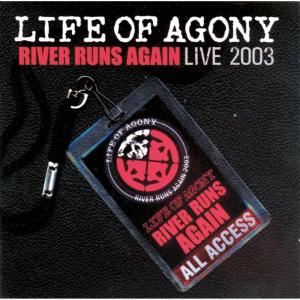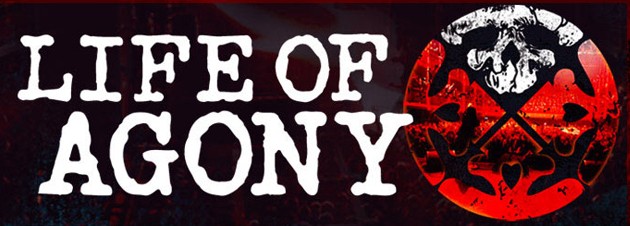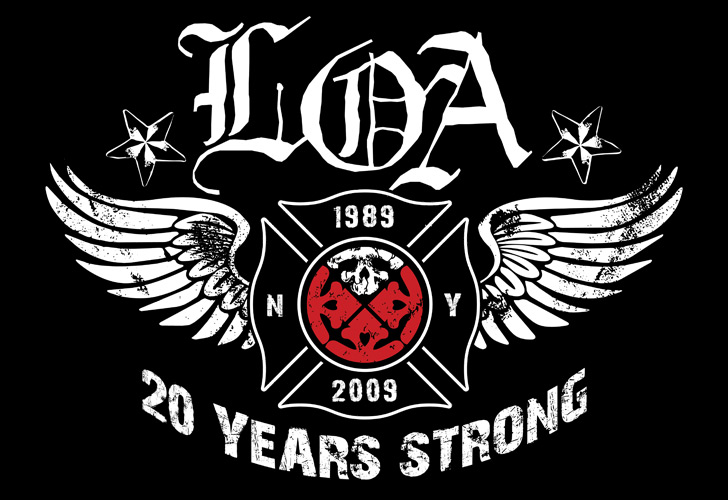In 1996, I discovered heavy metal.
I was drawn to it, fascinated by thunder double-kick drum beats, bone-crunching bass lines and guitar solos that lasted weeks on end. It was glorious. Seton Hall’s 89.5 WSOU was the proverbial Pandora’s box for me. I tuned into it on my mom’s 1985 Maxima station wagon, and I became forever metal.
One of the bands I distinctly remember being captivated by was the Brooklyn-based metal core band Life Of Agony. Never had I, or have I since, heard a band create a sound so heavy. Phil Spector’s “Wall Of Sound” is nothing compared to the impenetrable, epic and thunderous wall of sound that guitarist Joey Z, bassist Alan Robert and drummer Sal Abruscato created. Their triple threat of sound is tough, mean, aggressive, perfectly New York, yet it wasn’t the same chaos and confusion other metal bands enlist. LoA’s sound is tight, polished and impeccably composed.
Matching the sonic boom of LoA’s sound is the gigantic voice of lead singer Keith Caputo. His voice is one of the most unique in music — at times a thunderclap, at times utterly heartbreaking. It was the perfect instrument to convey the message of Life Of Agony’s lyrics. It wasn’t all about dragons and vikings — it was real life issues, ones that effected millions across the world.
This triple threat of amazing heavy metal, a brilliant lead singer and lyrical content that the common could relate with struck accord with metalheads across the world. They became a beloved part of people’s musical lives and this was none the more evident in 2003, when the band reunited after a multi-year hiatus and sold out two shows at New York’s Irving Plaza in under 20 minutes.
This Friday, Jan. 28, the band that had risen from the “underground” returns to The Starland Ballroom in Sayreville, N.J., for one of their classic super-charged live shows.
I spoke with guitarist Joey Z about the history of the band, the hardcore scene, the comeback and the future of Life Of Agony.
— Bill Bodkin

B&B: Life Of Agony came together in 1989 amidst the gigantic popularity of the speed metal success of Metallica and the hair metal bands like Poison and Motley Crue. What was the draw for you guys to perform hardcore music?
Joey Z: I think it was location. We’re from Brooklyn and we were listening to hardcore bands like Cro Mags, Carnivore, Agnostic Front, but we were also listening to stuff from Metallica and Slayer. But for the most part, we were smack in the middle of the hardcore scene. We didn’t work on a style really — just played what we thought sounded good. What do you think our sound is? It has always been difficult to put LoA into a category, and at first people either loved it or they hated it. Nobody ever said, “Yeah, they’re okay.” I really think this is the very reason we’ve developed such a loyal cult type of following. It’s is something we are very grateful for, and allowed us to have such serious staying power over the years. Hardcore would be the wrong category pin us in, but we do have elements and influences rooted deep within our bones.
B&B: I always thought bands like Life Of Agony, Helmet and Biohazard were part of a sub-genre of metal and hardcore, it’s that New York Hardcore sound. Although I think you guys were more metal than a Biohazard, as they incorporated more rap and hip-hop styling, while you guys had this amazingly huge wall of heavy metal sound.

JZ: Yeah man! It was totally metal core. You remember Repulsion? That was Peter Steele’s band which ended up being Type O Negative. They really had a lot to do with the spawn of that sub-genre.
B&B: In that same vein, what was the ’80s and early ’90s hardcore scene like? Who were your contemporaries and what venues were the hotbeds for the sound?
JZ: L’Amour [a famed rock club in Brooklyn] was our stomping ground. Bands like us, Lee Way, Sick Of It All, Biohazard, Carnivore, Type O— we all played there. When we weren’t playing, we were hanging out watching shows. We built the whole thing there. It was our spot, our home.
B&B: I remember hearing about L’Amour on WSOU back in the mid-’90s, then nothing. Did it shut down?
JZ: It moved to Staten Island — it’s a bit smaller. I played there when I was in Carnivore [with Peter Steele] as a favor. It was cool to play there, but it didn’t have the same magic.
The scene in general has diminished. I just heard an interview online with Jim Root and he said the scene had changed so much here in the U.S. That guy’s in Slipknot, and if he feels the scene has changed, you have to imagine how I feel.
I don’t feel the magic at the shows anymore. Don’t get me wrong — there are great moments, especially when we play places like Starland, Stone Pony and Iriving Plaza. But a lot of the cool clubs are gone: the old Ritz, Marquee Club, Zone BK. Even CB’s is gone! What the fuck is that all about? Why some rich guy couldn’t buy that place?
[youtube=http://www.youtube.com/watch?v=_HnDVKiWDYM]
And believe it or not, a lot of us are still out there. But we’re not playing as much as we used to. If we weren’t playing one night, then it was Biohazard or Lee Way or Cro Mags. Now, you’re lucky if you see these bands play once a year in the area.
But that’s why we all go to Europe. That’s where it’s at, man. The shows are insane, the scene is crazy, you feel the magic, the people go nuts at shows. Everyone here is worried about how they look at concerts — like if someone sees them letting loose and going crazy, people will think they’re not cool.
Don’t get me wrong — we’re blessed to have the experience of playing here. I just wish the crowds were a lot more nutty. [Especially because] we’re a lot better now than when we were back in the day.
But then again, I’m spoiled a bit. [Lead singer] Keith [Caputo] always says, “Joe, you’re spoiled.” I get upset when crowds don’t go absolutely crazy during the show. I’m always yelling at the crowd to go crazy.

We get that craziness when we play Starland. I told the guys while we were playing, “This looks like a war out there.”
B&B: In ‘94, you released the seminal album River Runs Red, and you were thrust from the close knit N.Y. hardcore scene into more of a mainstream spotlight. Was it difficult to transition from the “underground” to the mainstream?
JZ: Back then, we didn’t let anything like that phase us. It wasn’t until we got on the Ozzy and Korn tour that we felt it. Before that, we were happy about getting heard and becoming popular. It was exciting if anything happened. But we didn’t feel pressure. It was all about accomplishing milestones and upping it from there — it was like, “We sold 10,000 records in a week!” “We got on this tour!” It’s exciting, but you don’t feel it.
See: If you and I took a step back and took a look back at bands like Korn or The Deftones in the mid-’90s and then look at them now, you see, “Wow, look what they’ve done. They’ve played the Garden, sold millions of records.” We can see it because we’re looking in, but when you’re in it, you don’t see it, you just keep doing.

The time, we did feel it was when we got on the Korn/Ozzy tour [1996] and we were playing arenas. It was like, “Holy shit!” We’re in a hockey arena in the dressing room for the hockey and basketball players and Ozzy and Sharon comes back to welcome you to the tour. That’s when you realize it.
It’s cool because the sacrifice you make as a musician is unbelievable. When you have a family and they’re important to you, it’s a sacrifice to remain a musician. If family members are sick or dying you can’t see them. Your brother has a baby, and you miss it. You’re in Germany on Thanksgiving day. It might not sound like a lot, but it is.
B&B: Speaking of River Runs Red, in my opinion, it’s a classic, and many people would back me up. How does it feel to have such an album like this in your catalog?
JZ: It’s amazing. I use this word a lot … but we are grateful.
People really understood what that album was all about and felt a connection. A lot of bands really loved it, and that’s the highest compliment.
Bands like Disturbed, Drowning Pool, Machinehead, Soil, Shadows Fall, Seplatura have all told us they love it. Rob Halford [of Judas Priest] said it’s his favorite album to work out to.

When I was in Stereomud, we were touring with Disturbed. We were backstage, and David [Draiman] and Dan [Donegan] came back to say hi, and then David starts reciting and singing the words to “Underground!” He was like, “If you don’t walk with me … I will walk … aloooooooooooone!” I mean, he was still new to the industry, but this guy is selling tons of records and selling out arenas and he’s singing our song. When Dave Williams of Drowning Pool was alive, we met and he showed me that he had the album in the CD player on the bus. Rob Flynn of Machinehead said he loved the album and it’s in his Top 10 records of all-time. I mean, these are guys I have a lot of respect for.
Oh, Andreas of Seplatura — a guitarist I have so much respect for, his presence and energy — played one of our songs at the big Roadrunner United show. Scott Ian, Dave Mustaine, Kirk from Metallica — all have told me they love the album. I can’t believe it, these are guys I’ve molded my career after. And they’re saying what I did was awesome.
If everything ended today, I least have this record. I accomplished something.
B&B: On Soul Searching Sun, you can tell there was a distinct shift in the vocals of Keith Caputo, I know this is a hard question, because I sorta know the answer already, but how did that effect the band?
JZ: There was a shift in the band and it was a difficult time — that’s why it was difficult for you to ask. We got a new drummer and the band was just falling apart because of the situation. Everyone felt the change. We were getting pulled in different directions. It was definitely a transition time. One person was out of the band and it felt different. The chemistry was different. We opened up to each other differently.
You could tell Keith was losing interest in the band. He wanted to do some solo stuff, so he probably wasn’t there 100 percent.
In the end, what we pulled off was a good album. It wasn’t what people wanted to hear from us, but there’s good stuff on there. [Editor’s Note: download the track “Weeds” immediately.]
[youtube=http://www.youtube.com/watch?v=6JG0N_tpmZA]
After Keith left, we had a record recorded and it was either pack it all up or we worked too hard not to tour. So we brought in Whitfield Crane [formerly of Ugly Kid Joe]. Some people said it was a mistake. I don’t believe in mistakes — just looking back and learning from experience. It was a good time, but it almost felt like being in a cover band of your own band, and that’s when we knew it was time to hang it up.
And I think that’s what reeled a lot of people back in 2003. They wanted to see the Life Of Agony they wanted to see. We’re playing a lot of stuff they want to hear and we’re doing our best business as a band ever.
B&B: What made you guys decide to come back together in 2003?
JZ: The idea came from Cathy Campagna — an industry photographer and writer. She kept putting out there: “How awesome would it be if Life Of Agony came back with the original guys?” Then people started asking about a reunion show at Irving Plaza. [Around that time,] Keith’s dad had passed away and Alan [Robert] came back for the funeral. We all talked about it a little there, and then I had to go back out on tour with Stereomud. I keep thinking about it, and when I came back, we were all like, “Yeah, let’s do this.” Then, the first show sold out in five minutes. They immediately put the second show and it sold out in 13 minutes. We were like, “What the fuck!” Two shows sold out in 18 minutes. We got it confirmed by Ticketmaster, too — we couldn’t believe it.

B&B: Can you describe the emotion before the proverbial curtain went up on the show?
JZ: It was absolutely crazy! Have you seen the DVD of the reunion show? I was in tears — I was literally crying like a baby. We had lost Keith’s dad and earlier his mom and we were singing songs that were based on them. It was really crazy emotional. The energy at that show was crazy. I couldn’t get rid of my goosebumps the whole show. It was one of the highlights of my career, and we knew we had to carry on with that vibe — the energy was too good.
We carried that over into a new album Broken Valley — which was cool, but could have been a lot better. We had a lot of time constraints. We had only two new songs written and the label wanted another 12 in a short period of time. We pulled it off — I’m proud of that.
B&B: Did you expect people to be that excited to see you reunite?
JZ: We thought, “Is anyone going to care?” We knew people would probably come but not with that much force and energy. We found out people couldn’t wait. They flew in from California, Europa. One person told us they traveled 12 hours from Czech just to be there. There was a lot of love [for us] that we didn’t realize. We had done nothing for six years. They must’ve missed us.
B&B: Last year, you guys performed the entire River Runs Red album on tour. What’s more difficult as a performer: developing a setlist from your catalog or playing one album with certain cuts you haven’t performed in years?
JZ: It was exciting. Our songs aren’t all that difficult — we wrote them when we were kids. However, simple doesn’t mean it’s not interesting. It’s easy to play but it’s interesting variations of the classic riffs. I remember when we finished rehearsing “Words And Music” — which hadn’t done since the early ’90s — we’re all were laughing because it just felt really good to play these songs.
Playing an entire album as opposed to a regular setlist is a little restrictive. We love variety, and sometimes you have to read a crowd and you know you have to switch things up. Like, say Keith feels we need to do “Lost At 22” and he’ll run over to me and the other guys and we’ll change it up, which our lighting and sound guys love. With album performance, you’re tied to the set. We did come back out after we finishing performing the album and played other songs. If we just played River Runs Red, we’d have a 45 minute show. So we come out for another 40-45 minutes and play our other songs.
B&B: What can we expect from your upcoming Starland Ballroom show?
JZ: Without sounding cheesy, a classic Life Of Agony show. We’re not repeating the last show by just playing River Runs Red. Pretty soon we’re going to have some new songs to play, and I think people are waiting for that.
B&B: So there is new stuff on the horizon?
JZ: Alan shared a cool piece of music recently, and I just e-mailed Keith a few nights ago with some new riffs. Hopefully, very soon we’ll have some new songs.




First and foremost congrats on the web site and good luck.
Outstanding interview. I don’t think you missed a beat,no pun intended, in this interview.
When I saw the title of the blog I thought you were doing my biography.
Awesome interview on an awesome band and guitarist. Saw the show in 2009 at the Starland–monumental!